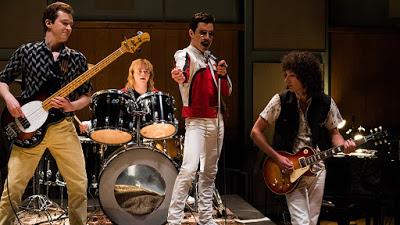Format: DVD from Cortland Public Library on rockin’ flatscreen.

I’ve gotten a bit of pressure from a number of people around me to finally get around to Bohemian Rhapsody. I’m not always a fan of biopics and while Queen was a great band, they’re one of those bands that, as much as I like a lot of their songs, I never thought to buy any of their albums (and yes, I’m old enough that I can say “albums”). I was also a bit disturbed at the bizarre prosthetics that Rami Malek was evidently forced to wear in his role as Freddie Mercury. I realize that Mercury had big teeth, but Malek spends a good portion of this film looking like a Dr. Seuss character.
Anyway, I finally got around to this and I’m still kind of formulating an opinion on it. I think, in the main, that I liked it, but there are some problems that I have with it. We’ll certainly get to that by the end of this, but I want to start by saying that I was probably wrong as a young’un to have not bought any Queen discs. One of the better features of Bohemian Rhapsody is a reminder of just how good a lot of their songs really are, and how many of them they had.
Anyway, the film is almost a biopic of Freddie Mercury with a generous slice of “this is actually about the band” thrown in. What I mean is that Mercury is clearly the central figure of the film and we’re going to follow him for most of the film, but there will be moments when we deal more with the other members of the band. These, however, will be few and far between as we are much more likely to be dealing with the excesses of Mercury’s huge personality.
That huge personality creates one of the more interesting aspects of the film. Early on, we see Mercury as a sort of larger-than-life character, someone who refuses to be constrained by the world that he exists in. He breaks out of his straight-laced family environment to blossom on stage as, well, a character of his own name and creation. His affair with girlfriend-turned-fiancée-turned-friend Mary Austin (Lucy Boynton) gives us a familiar boy/girl chemistry early on that becomes a sort of needy friendship as Mercury comes out of the closet, at least to himself.
And eventually, this leads to Mercury becoming more and more built up in his own mind and attempting a solo career, alienating his bandmates and friends. And, of course, this happens with the realization that he is dying of AIDS. The film culminates in the (honestly—I remember this) triumphant Queen performance at Live Aid. This is not a spoiler. It’s clearly hinted at in the opening moments of the film, and it’s not like Freddie Mercury died right after the performance—he lived another six or so years. But it is, kind of, the culmination of the story the movie wants to tell. Boy meets band, boy loses band, boy comes back to band almost too late.
One thing Bohemian Rhapsody does really well is mimic the actual members of Queen. The rest of the band—Brian May (Gwilym Lee), Roger Taylor (Ben Hardy), and John Deacon (Joseph Mazzello) look staggeringly like their real-life counterparts. Lee in particular looks like the producers somehow traveled through time to collect a circa-1980 Brian May to have him work in the film. I’m not sure how they did it, but it’s uncanny.
There are a few good jokes here as well. The best is that EMI producer Ray Foster is played by an almost unrecognizable Mike Meyers who loses the band over a conflict with the song Bohemian Rhapsody. He suggests another song or two for the single from the album, saying that this is a song that kinds wouldn’t sit in their car and bang their heads to. The joke, of course, is that Meyers was almost single-handedly responsible for a resurgence Queen fandom in 1992 with the head-banging-to-Bohemian-Rhapsody scene in Wayne’s World. This is not a fanciful story—the song returned to the charts after Meyers’s movie released and topped at number 2, several places higher than its original release.
Rami Malek won the Best Actor Oscar for this role, and there’s a part of me that thinks he may have won specifically because he was able to speak through the ridiculous prosthetic. He certainly gives us a warts-and-all depiction of Mercury, who does not come off too well in the film. Mercury is depicted here as a selfish, vainglorious prima donna who made the lives of a lot of people worse for his own pleasure. I think the reality might go there a bit, but it also wouldn’t surprise me if Mercury himself had been ill-used by others. This is also hinted at in the film. For what it’s worth, the other members of Queen come out of this pretty well in that regard. But it does feel...as if the redemption is rushed and cheap for a movie that's this long. Freddie's years of excess and hurting others and disappointing his father specifically appears to be suddenly cured by his participation in Live Aid and not accepting pay for it--somehow doing the thing that virtually everyone in that position did without question is living up to his father's philosophy.
I have to say that I didn’t love the movie and I didn’t love this cinematic depiction of the lead character. But I was reminded of just how good Queen really was and how many of their songs are what the kids today would call a “banger.” Seriously, they kicked a whole lot of ass a whole lot of the time.
Why to watch Bohemian Rhapsody: Seriously, Queen put out a lot of great friggin’ songs.
Why not to watch: It’s not at all the movie that you expect it to be.
